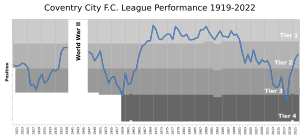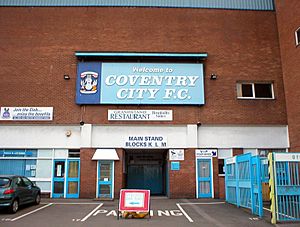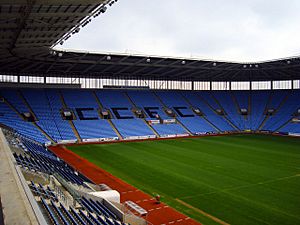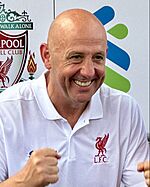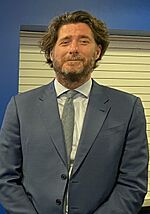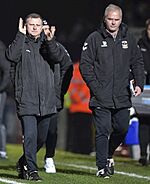Coventry City F.C. facts for kids
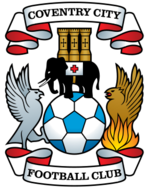 |
||||
| Full name | Coventry City Football Club | |||
|---|---|---|---|---|
| Nickname(s) | The Sky Blues | |||
| Founded | 13 August 1883 (as Singers F.C.) |
|||
| Ground | Coventry Building Society Arena | |||
| Capacity | 32,609 | |||
| Owner | Doug King | |||
| Chairman | Doug King | |||
| Manager | Frank Lampard | |||
| League | League One | |||
| 2018–19 | League One, 8th of 24 | |||
|
||||
Coventry City Football Club is a professional football team from Coventry, England. They are often called The Sky Blues because of their famous sky blue uniforms. The club plays in the EFL Championship, which is the second highest league in English football.
Coventry City started in 1883 as Singers F.C., named after the Singer Cycle Company. They changed their name to Coventry City in 1898. The club joined the Football League in 1919. Over the years, they moved up and down different leagues. A big moment came in the 1960s under manager Jimmy Hill, when they reached the top division for the first time.
The team stayed in the top division for 34 years, from 1967 to 2001. They were even part of the first Premier League season in 1992. Coventry City's biggest win was the FA Cup in 1987, where they beat Tottenham Hotspur 3–2 in a thrilling final. This is their only major trophy. More recently, they won the EFL Trophy in 2017 and were promoted back to the Championship in 2020. In 2023, they almost reached the Premier League again but lost in the play-off final.
For a long time, Coventry City played at Highfield Road stadium. In 2005, they moved to the Coventry Building Society Arena. However, the club has faced challenges with their stadium, sometimes having to play their home games in other cities due to disagreements.
Contents
Club History
How it All Started (1883–1919)
Coventry City began in 1883 as Singers F.C. It was formed by people from the Singer Cycle Company. In their early years, they played at Dowells Field and later at Stoke Road Ground. They became a professional team in 1892.
The club changed its name to Coventry City in 1898. In 1899, they moved to their famous Highfield Road stadium. The club joined the Southern League in 1908. A big achievement was reaching the FA Cup quarter-finals in 1910.
Joining the Football League (1919–1945)
In 1919, Coventry City joined the Football League, playing in the Second Division. They faced some tough times, including financial problems and being relegated. In 1928, they had their lowest ever attendance at a game.
Things started to get better in the 1930s with manager Harry Storer. The team became known as "The Old Five" because they often scored five or more goals in games. In the 1931–32 season, Clarrie Bourton scored 49 goals, which was a league record. Coventry City won the Third Division South title in 1936, moving up to the Second Division. World War II stopped league football in 1939, and the club's stadium was damaged during the Coventry Blitz.
Reaching the Top and Winning the FA Cup (1945–1987)
After the war, Coventry City struggled for a while and were relegated again. But in 1958, Derrick Robins became chairman, and in 1961, Jimmy Hill became manager. This started the "Sky Blue revolution." Hill changed the team's colours to sky blue, created the famous Sky Blue Song, and brought new excitement to the club.
Under Hill, Coventry City won the Third Division in 1964 and the Second Division in 1967. This meant they reached the top division of English football for the first time! In 1970, they finished sixth in the First Division, their highest ever position. This earned them a spot in the European Inter-Cities Fairs Cup.
In 1987, Coventry City had their most famous moment. They won the FA Cup, beating Tottenham Hotspur 3–2 in an amazing final at Wembley Stadium. This was the club's first and only major trophy.
Recent Times (1987–Present)
After their FA Cup win, Coventry City continued to play in the top division. They were one of the founding teams of the Premier League in 1992. However, financial issues led to them selling key players. In 2001, they were relegated from the Premier League after 34 years.
The club faced more challenges, including being relegated to League One and League Two. They also had problems with their new stadium, the Coventry Building Society Arena, which opened in 2005. This led to them playing home games in other cities for a while.
Despite these difficulties, Coventry City won the EFL Trophy in 2017. They were promoted back to League One in 2018 and then won the League One title in 2020, returning to the Championship. In the 2022–23 season, they reached the Championship play-off final but lost on penalties. In 2024, Frank Lampard became the new manager.
Team Kit
Colours and Designs
Coventry City's home kit is usually sky blue. However, they have worn other colours in the past. In 1889, as Singers FC, they wore pink and blue shirts. In the 1890s, their colours were black and red. In the 1920s, they wore red and green, matching the city's crest.
Sky blue first appeared in 1898 but was brought back permanently in 1962 by manager Jimmy Hill. To celebrate their 125th year in 2009, Coventry wore a special brown shirt. In 2012 and 2013, they wore a blue and white striped kit to mark 25 years since their FA Cup win. In 2019, a black and white kit was released to honour the city's connection to 2 Tone Records.
Kit Makers and Sponsors
Since the 2019–20 season, Hummel has made Coventry City's kits. The main sponsor on the front of the shirt is Monzo, and King of Shaves is on the back.
Coventry City was one of the first clubs to have a kit sponsorship deal. In 1980, chairman Jimmy Hill arranged a deal with Talbot, a car company based in Coventry.
| Period | Kit manufacturer | Shirt sponsor | Shorts sponsor |
|---|---|---|---|
| 1974–75 | Umbro | None | None or N/A |
| 1975–80 | Admiral Sportswear | ||
| 1980–81 | Talbot | ||
| 1981–83 | Big T | ||
| 1983–84 | Umbro | Tallon | |
| 1984–85 | Glazepta | ||
| 1985–86 | Elliotts | ||
| 1986–87 | Triple S Sport | Granada Bingo | |
| 1987–88 | Hummel | ||
| 1988–89 | None | ||
| 1989–92 | Asics | Peugeot | |
| 1992–94 | Ribero | ||
| 1994–96 | Pony International | ||
| 1996–97 | Le Coq Sportif | ||
| 1997–99 | Subaru (home)
Isuzu (away) |
||
| 1999–2004 | In House Manufacturer (CCFC Leisure) | ||
| 2004–05 | Kit@ | ||
| 2005–06 | Cassidy Group | ||
| 2006–10 | Puma | ||
| 2010–13 | City Link | ||
| 2013–14 | Grace Medical Fund (charity partner) | ||
| 2014–15 | Allsopp & Allsopp | ||
| 2015–18 | Nike | ||
| 2018–19 | Midrepro | ||
| 2019–20 | Hummel International | Allsopp & Allsopp | The Exams Office |
| 2020–21 | BoyleSports (front), Jingltree (back) | G&R Scaffolding (home), SIMIAN Aspects Training (away) | |
| 2021–23 | BoyleSports (front), XL Motors (back) | ||
| 2023–24 | King of Shaves (front), XL Motors (sleeve), Coventry Building Society (rear) | G&R Scaffolding | |
| 2024– | Monzo (front), Mercury (sleeve), King of Shaves (rear) |
Home Stadiums
Highfield Road: The Old Home
Coventry City played at Highfield Road from 1899 to 2005. It was built on land previously used by a cricket club. The first game there was a 1–0 win against Stoke City.
Over the years, the stadium was improved with new stands and floodlights. During World War II, it was damaged by bombs in the Coventry Blitz. In 1981, it became England's first all-seater stadium, meaning every fan had a seat. However, this was not popular with all supporters, and some standing areas were brought back later. Highfield Road hosted its last game in 2005 and was then taken down to build new homes.
Coventry Building Society Arena: The New Home
In 2005, Coventry City moved to a new stadium, now called the Coventry Building Society Arena. It was first known as the Ricoh Arena due to a sponsorship deal. This modern stadium also has an exhibition hall, a hotel, and a casino.
The club has faced challenges with the stadium's ownership and rent. This led to them playing their home games at other stadiums, like Sixfields Stadium in Northampton (2013–2014) and St Andrew's in Birmingham (2019–2021). Fans often protested these moves. In 2021, they returned to the Coventry Building Society Arena, and a new agreement was reached in 2022 for them to continue playing there.
Supporters
The Sky Blue Army
Coventry City fans are known as The Sky Blue Army. In Coventry and Warwickshire, people say "Going Up The City" when they are going to watch a match.
The number of fans attending games changed a lot during a period when the club had ownership problems. When the team had to play in Northampton in 2013–14, the average attendance dropped significantly.
The Sky Blue Song
The club's famous song was written in 1962 by manager Jimmy Hill and director John Camkin. It uses the tune of the "Eton Boating Song." The words were printed in the match programme and quickly became popular.
Here are the original and current words:
Famous Fans
Many famous people support Coventry City. These include TV broadcasters Richard Keys and Jon Gaunt. Formula 1 team principals Christian Horner and Ayao Komatsu are also fans.
Comedian Josh Pugh and musicians like Neville Staple from The Specials and Tom Grennan also support the Sky Blues. Actor Graeme Hawley from Coronation Street is a season ticket holder. Even actor Frankie Muniz from Malcolm in the Middle is said to be a fan!
Rival Teams
Coventry's main rival is Aston Villa. Historically, they played against each other often in the top leagues. Another important rivalry is with Leicester City, known as the M69 Derby. These games are always exciting.
There's also a unique long-distance rivalry with Sunderland. This started in 1977 when a controversial match result between Coventry and Bristol City meant Sunderland was relegated. Some Sunderland fans still hold a grudge about this. More recently, games between Coventry and Sunderland have been very competitive.
Team Players
First-Team Squad
|
|
Notable Players in History
Many great players have worn the Sky Blue shirt. Here are some of the most famous ones who are part of the club's Hall of Fame:
|
|
|
|
Academy Graduates Who Made It Big
Coventry City's youth academy has produced many talented players who went on to have successful careers. Some even played for their national teams!
| Player | Achievements |
|---|---|
| Plays for England, was part of the 2022 World Cup squad. | |
| Plays for England, was part of the 2022 World Cup squad. | |
| Played for England, won the UEFA Champions League in 2012. | |
| Played for England, won the UEFA Champions League in 2005. | |
| Played for Republic of Ireland. | |
| Played over 250 games for Coventry. | |
| Won the EFL Trophy and League Two play-offs with Coventry. |
Player Records
Here are some interesting records held by Coventry City players:
| Record | Details |
|---|---|
| Most games played (all competitions) | |
| All-time top scorer (all competitions) | |
| Most goals in one game | |
| Most goals in one season | |
| Youngest player to play in a first-team match |
Club Management
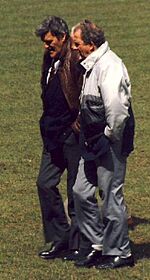
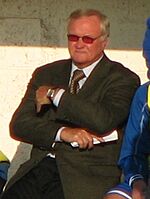
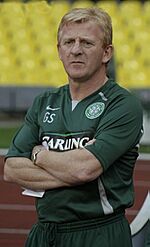
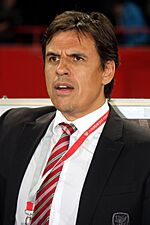
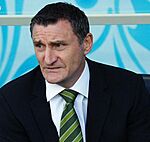
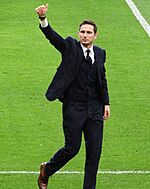
The club has had many managers and chairmen throughout its history. Here are some of the key people who have led Coventry City:
Permanent manager
| Dates | Chairman | Dates | Manager(s) |
|---|---|---|---|
| 1883–1907 | Unknown | 1883–1885 | |
| 1885–1887 | |||
| 1887–1892 | |||
| 1893 | |||
| 1893 | |||
| 1893–1895 | |||
| 1895–1900 | |||
| 1900–1902 | |||
| 1902–1905 | |||
| 1905–1907 | |||
| 1907–1912 | 1907–1908 | ||
| 1908–1909 | |||
| 1909–1910 | |||
| 1910–1912 | |||
| 1912–1928 | 1912–1913 | ||
| 1913–1915 | |||
| 1915–1917 | |||
| 1917–1919 | |||
| 1919–1920 | |||
| 1920–1924 | |||
| 1924–1925 | |||
| 1925–1928 | |||
| 1928–1935 | 1928 | Vacant | |
| 1928–1931 | |||
| 1931 | |||
| 1931–1935 | |||
| 1935–1946 | 1935–1945 | ||
| 1945–1946 | |||
| 1946–1954 | 1946–1947 | ||
| 1947 | Vacant | ||
| 1947–1948 | |||
| 1948–1953 | |||
| 1953–1954 | Vacant | ||
| 1954–1958 | 1954 | ||
| 1954–1955 | |||
| 1955 | |||
| 1956 | |||
| 1956–1957 | |||
| 1957–1958 | |||
| 1958–1960 | 1958–1960 | ||
| 1960–1973 | 1960–1961 | ||
| 1961–1967 | |||
| 1967–1972 | |||
| 1972 | |||
| 1972–1973 | |||
| 1973–1975 | 1973–1974 | ||
| 1974–1975 | |||
| 1975–1977 | 1975–1977 | ||
| 1977–1980 | 1977–1980 | ||
| 1980–1983 | 1980–1981 | ||
| 1981–1983 | |||
| 1983–1984 | 1983 | ||
| 1983–1984 | |||
| 1984–1990 | 1984 | ||
| 1984–1986 | |||
| 1986–1987 | |||
| 1987–1990 | |||
| 1990 | |||
| 1990–1993 | 1990–1992 | ||
| 1992 | |||
| 1992–1993 | |||
| 1993 | 1993 | ||
| 1993–2002 | 1993 | ||
| 1993–1995 | |||
| 1995–1996 | |||
| 1996–2001 | |||
| 2001–2002 | |||
| 2002–2005 | 2002 | ||
| 2002 | |||
| 2002–2003 | |||
| 2003–2004 | |||
| 2004 | |||
| 2004–2005 | |||
| 2005 | |||
| 2005 | |||
| 2005–2007 | 2005–2007 | ||
| 2007 | |||
| 2007 | |||
| 2007 | 2007 | ||
| 2007–2011 | 2007–2008 | ||
| 2008 | |||
| 2008–2010 | |||
| 2010 | |||
| 2010–2011 | |||
| 2011 | 2011 | ||
| 2011 | |||
| 2011 | |||
| 2011–2012 | 2011–2012 | ||
| 2012–2014 | Vacant | 2012 | |
| 2012 | |||
| 2012–2013 | |||
| 2013 | |||
| 2013–2014 | |||
| 2014–2023 | 2014–2015 | ||
| 2015 | |||
| 2015–2016 | |||
| 2016 | |||
| 2016–2017 | |||
| 2017–2023 | |||
| 2023– | 2023–2024 | ||
| 2024 | |||
| 2024– |
Club Achievements
Coventry City has won several important trophies and titles throughout its history:
League Titles
- Second Division (Level 2)
- Champions: 1966–67
- Third Division South / Third Division / League One (Level 3)
- Champions: 1935–36, 1963–64, 2019–20
- Fourth Division / League Two (Level 4)
- Play-off winners: 2018
Cup Wins
- FA Cup
- Winners: 1986–87
- EFL Trophy
- Winners: 2016–17
- Third Division South Cup
- Winners: 1935–36
- Birmingham Senior Cup
- Winners: 1910–11, 1922–23, 2006–07
- Southern Professional Floodlit Cup
- Winners: 1959–60
See also
 In Spanish: Coventry City Football Club para niños
In Spanish: Coventry City Football Club para niños


